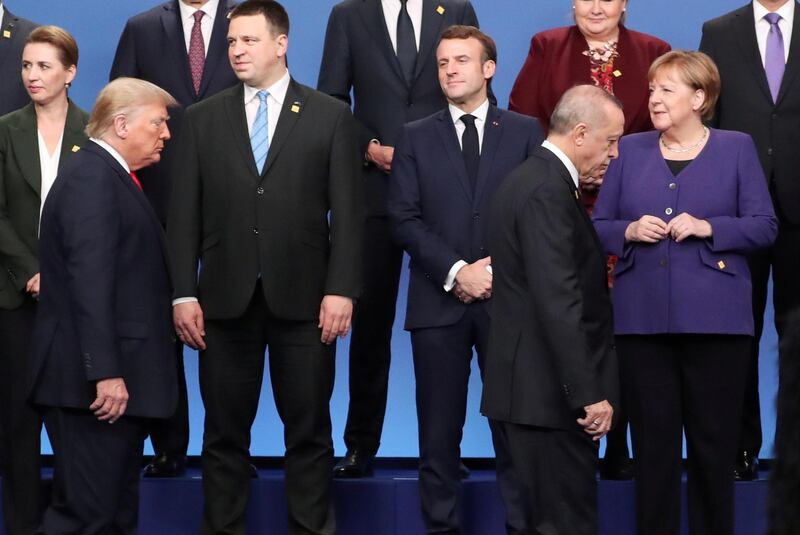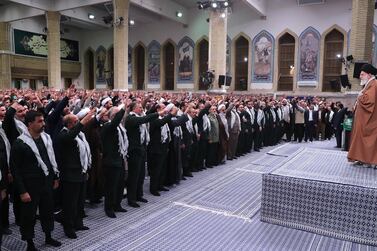This week’s summit in London marking the 70th anniversary of the North Atlantic Treaty Organisation, or Nato, ended with the 29-member alliance still intact. That this is a remarkable achievement shows how deeply divided the house is these days.
The summit opened amid speculation that US President Donald Trump might follow through on the threat he is said to have made at a previous Nato summit in Brussels in 2018: to end America’s involvement in the alliance over his oft-repeated complaint that too many European nations are not paying their fair share towards Nato’s running costs.
The focus then moved to France after Mr Trump suggested that French President Emmanuel Macron intended to leave the alliance in the wake of his recent comments, made in an interview with the Economist magazine, that he regarded Nato as being "strategically brain dead".
By the time the conference ended, questions were being raised about Turkey’s continued membership of the alliance following Turkish President Recep Tayyip Erdogan’s recent decision to purchase Russia’s S-400 anti-aircraft missile system, which was specifically designed to shoot down Nato warplanes. Indeed, the Turks are reported to have already been testing the system on the Turkish air force’s fleet of US-made F-16 fighters.
These developments demonstrate that some very deep divisions lie at the heart of the alliance’s current structure.
The open discord that was on show during the London summit, with Mr Trump describing his French counterpart as “nasty” and Canadian Prime Minister Justin Trudeau caught mocking the US President in front of other Nato leaders, is a far cry from the spirit of transatlantic solidarity that was very much in evidence when the Washington Treaty that officially established Nato was signed in 1949.
The alliance was formed against the backdrop of the growing threat posed by the Soviet Union after Winston Churchill had memorably described the tensions between the Western democracies and the Kremlin as a “Cold War” in a speech at Fulton, Missouri in 1947. The 12 original founding members of the alliance, which included the US, Britain, France and Canada, committed themselves to defending the freedoms enshrined in western democracies against the tyranny of Soviet communism.
At the end of the Cold War, Nato’s success in prevailing against the Soviet threat resulted in a number of liberated eastern European states clamouring to join the alliance, with the Czech Republic, Poland and Hungary being the first former Soviet satellites to formally join the alliance in 1999. Since then, a number of new states from the Baltics to the Balkans have joined to bring the current membership total to 29, with a cluster of other states waiting in the wings, including Bosnia and Herzegovina, Georgia, the Republic of North Macedonia and Ukraine.
The alliance, moreover, had in recent years been able to sustain the spirit of solidarity that prevailed during the Cold War, most notably in the aftermath of the September 11 attacks in 2001 when member states had little hesitation in invoking Article Five of the Nato treaty, the mutual defence doctrine that an attack on one state is deemed an attack on the entire alliance. This resulted in the high point of post-Cold War cooperation as the majority of member states supported Nato’s mission in Afghanistan.
Nato’s fundamental aim still remains to safeguard the security of all its members, even though recent tensions between the US and Europe, as well as Mr Erdogan’s Islamist agenda in Turkey, have created serious tensions that risk undermining the organisation’s original sense of unified purpose.
First and foremost among the challenges facing the alliance’s future effectiveness is the continuing uncertainty about America’s commitment to Nato under Mr Trump. As Jens Stoltenberg, Nato’s secretary general, revealed at the start of the London summit, the US president’s unhappiness about the failure of most European member states to meet Nato’s minimum defence spending commitment of 2 per cent of GDP in previous summits has had the desired effect of boosting Nato’s coffers by around $130 billion, with that figure expected to rise as high as $400 billion by 2024.
Mr Stoltenberg personally praised the US leader for his “leadership on defence spending”. However, this did not stop Mr Trump from raising the issue at the London summit again; he publicly criticised Mr Trudeau for not meeting the 2 per cent limit.
Another vexing issue for Nato leaders is Turkey and whether, in view of its deepening ties with Russia, it should be allowed to retain its membership. The main cause of the tensions between Mr Macron and Mr Trump in London stemmed from the American president’s decision in October to allow the Turks free rein to invade northern Syria at the expense of the Syrian Kurds, who have been close allies of the US-led coalition in the fight against ISIS. The picture is further complicated by Mr Trump’s close relationship with Mr Erdogan, with the two leaders enjoying a private bilateral meeting on the fringes of the London summit.
Then there are the conflicting signals Mr Trump is giving out about his relationship with Russia, which Nato regards as posing the most serious threat to its security. While Washington has taken a tough line with the Kremlin, especially in the wake of last year's Salisbury poisoning in Britain, which resulted in fresh sanctions being imposed against Moscow, Mr Trump also takes pride in his personal relationship with Russian President Vladimir Putin.
What the US president would do well to remember, though, is that Russia desires nothing more than the demise of the alliance. For Nato to survive another 70 years, therefore, it needs to rediscover the unified approach that enabled the western powers to win the Cold War.
Con Coughlin is the Telegraph’s defence and foreign affairs editor






